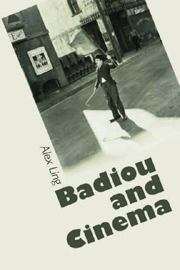Book contents
- Frontmatter
- Contents
- Acknowledgements
- Abbreviations of Frequently Cited Texts
- Introduction: Gorky's Maxim
- 1 Presenting Alain Badiou
- 2 Can Cinema be Thought?
- 3 In the Kingdom of Shadows
- 4 An Aesthetic of Truth
- 5 An Instant or an Eternity: Thinking Cinema After Deleuze
- 6 Alain Resnais and the Mise en Scène of Two
- 7 The Castle of Impurity
- Conclusion: The Future of an Illusion
- Bibliography
- Filmography
- Index
1 - Presenting Alain Badiou
Published online by Cambridge University Press: 12 September 2012
- Frontmatter
- Contents
- Acknowledgements
- Abbreviations of Frequently Cited Texts
- Introduction: Gorky's Maxim
- 1 Presenting Alain Badiou
- 2 Can Cinema be Thought?
- 3 In the Kingdom of Shadows
- 4 An Aesthetic of Truth
- 5 An Instant or an Eternity: Thinking Cinema After Deleuze
- 6 Alain Resnais and the Mise en Scène of Two
- 7 The Castle of Impurity
- Conclusion: The Future of an Illusion
- Bibliography
- Filmography
- Index
Summary
The millions that around us are rushing into life cannot always be fed on the sere remains of foreign harvests. Events, actions arise, that must be sung, that will sing themselves.
Ralph Waldo EmersonThe shock of the new
All changed, changed utterly:
A terrible beauty is born.
William Butler YeatsFrench philosophy has often found itself playing the role of romantic object to Anglophone academia's desiring subject. The frequent attempts of the latter to devour the concepts put forward by the former are evidenced as much by the ongoing influence exerted by those grand spectres of twentieth-century French thought – the Derridas, the Foucaults, the Lyotards, the Deleuzes – as by the omnipresence of what is, after a fashion, their most abiding legacy, namely, poststructural and postmodern theory. Given the weight we grant French thought it is remarkable how long it has taken for the work of Alain Badiou – who without doubt is numbered among the most important philosophers of both the twentieth and twenty-first centuries – to receive serious attention. Although Badiou has published steadily since 1969's Le Concept de modèle, the inaugural English translation of one of his works – Norman Madarasz's rendering of Manifesto for Philosophy – only appeared comparatively recently in 1999. Meaning that, as far as English-speaking audiences go, Badiou barely scraped his way into the twentieth century (a fact not without a hint of irony, given that one of his most impressive and accessible works is consecrated to the same century).
- Type
- Chapter
- Information
- Badiou and Cinema , pp. 14 - 31Publisher: Edinburgh University PressPrint publication year: 2010



